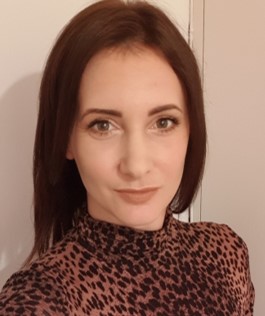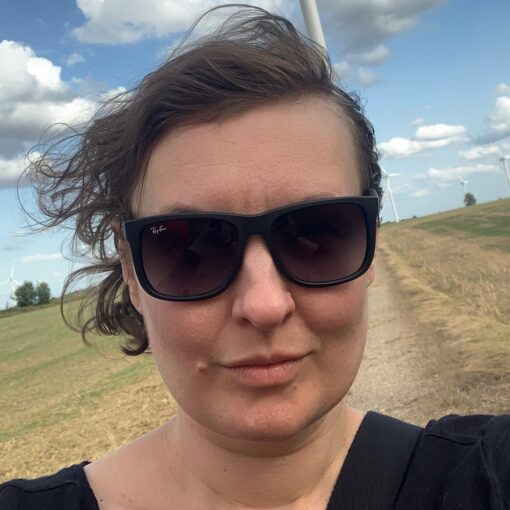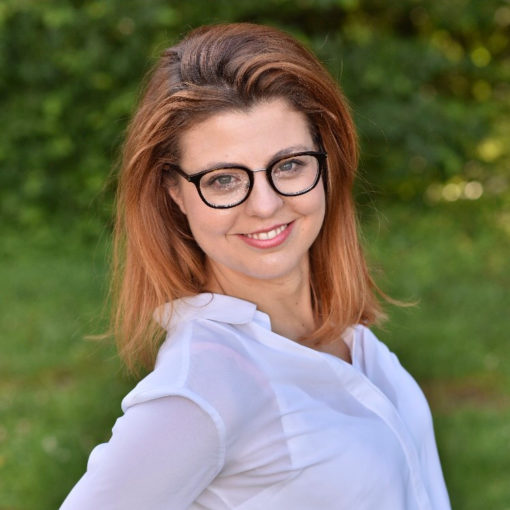D.Phil molecular genetics, University of Oxford (2016)
| Senior Medical Copywriter | |
|---|---|
| TBWA\WorldHealth London | |
Year entered into a non-academic position: 2016
Job highlight: Getting to use my love of writing to help exciting new treatments reach patients who need them
My research training set me up to… Turn complex scientific data into engaging storytelling that can drive behaviour change in my target audience
Left academia after: PhD
What’s your background?
I took a somewhat unorthodox route through higher education: after one year studying physiology at Bristol University, I left for personal reasons and spent three years working as an administrator in a couple of different companies. When I eventually decided to return to university in 2008, I had the intention of completing an undergraduate degree that would enable me to apply for post-grad veterinary medicine, so I took up a place at the Royal Veterinary College (University of London) studying Bioveterinary Sciences.
I credit the brilliant course at the RVC for introducing me to academic research – during my second-year lab project I made the decision that instead of applying to veterinary medicine, I wanted to do a PhD. I was offered a place at Oxford, based in the Mammalian Genetics Unit at Harwell, where I spent four years completing my D.Phil in the genetics of testis development in mice.
Why did you move away from academia?
Whilst I enjoyed my D.Phil and liked lab work in general, I realised that I’m perhaps not quite cut out for the consistent, sometimes inexplicable, experiment failure, and the long time that it can take to get results. I also realised that postdoc life might not be for me: the prospect of uprooting myself every 3 years or so, and the pressure of publishing to ensure you could get a job sounded daunting, and I decided I might prefer a career with a little more structure and long-term security.
Lastly, writing up my thesis also confirmed that I love writing about science and was also very good at it (even my viva examiners said so!), and that perhaps I should embrace that.
Is there anything you miss about academia?
Standing up and not sitting down all day! I definitely miss the physical aspect of actually doing the lab work and the fun that went alongside it – chatting with colleagues while you’re waiting for the centrifuge, doing your dissections together, etc. The problem-solving aspect could also be fun, when it wasn’t utterly infuriating!
How did you get this job? Did you face any challenges when considering a move away from academia or applying for the role?
This is actually my second job in the medcomms industry. I didn’t even know it existed until I saw an email about a medcomms careers fair being held at the University of Oxford. When I read about it, and how it requires a combination of scientific acumen and ability to communicate ideas clearly and simply, I thought it sounded right up my street.
I’d read it can be difficult to get your first job in medcomms but I was lucky to find it extremely easy to get my first position and stayed at that agency for two years before moving on to this role.
Much like with the first one, I didn’t have trouble getting this job. I’d decided to make a shift to a more creative agency, which specialises in healthcare advertising rather than the drier scientific communications that my previous agency produced. Making the move was a little daunting but, thankfully, there’s a huge demand for medical writers across the whole industry.
What motivated you to/why did you choose the sector you transitioned into?
I felt it offered a perfect way to combine my skills – science and writing. Translating complex topics into clear, compelling storytelling really appealed to me as it had been how I approached writing my thesis.
Did you think you had the skills required for your current position before you started? Were you right?
Yes, and yes!
How did your PhD prepare you for your current job? For example, what were the transferable skills that you developed during your PhD that are most relevant to your current job?
Doing my PhD gave me an unparalleled opportunity to practice writing about complex scientific topics. But the skills I gained go way beyond just being able to write well. My time in academia had given me a ton of additional skills that I knew would be invaluable, like:
- Collaboration
- Presenting (and handling tricky questions!)
- Managing setbacks
- Asking for help when you need it
- Organising time
All these set me up brilliantly to start a career as a writer in an agency environment, where you’re constantly collaborating, regularly presenting to clients, and dealing with challenges and criticism. It also helped me to progress a lot quicker than someone fresh from their undergraduate degree might, so it’s a huge advantage.
Did you have any preconceptions about your sector that proved to be wrong?
Not really, as I didn’t really know what it was until that first careers fair! I think what I wasn’t expecting was the level of collaboration involved in medical writing – it’s not just you, sitting at a desk, beavering away writing a paper, there’s a lot of communication between your team and your clients that helps shape the work you create.
Can you describe a typical week in your job?
Each week is usually different, but typically, Monday starts with an all-agency overview meeting where each team gives a quick summary of what they’ve got on for the week. I’m currently working on a large oncology brand with a big launch coming up, so my team has a daily ‘huddle’ at 10am to talk over the priorities for the day. Then I usually spend the day working on one or two of my projects. My main project right now is a ‘sales aid’ for the drug I work on. This is a document (usually presented on a tablet) that pharmaceutical sales reps use to show the doctor all the clinical data for the drug and try to convince them to prescribe it. They’re fun to create because as well as writing the content, I get involved with the design of the piece and the interactivity, to help create something that’s eye-catching, compelling and user-friendly.
Each day is usually peppered with client calls, some are regular status updates but others are more in-depth reviews of our work. On a review call, I’ll take them through a work-in-progress version of a piece and we’ll discuss their feedback, then it’s my job to rewrite things if needed, and work with the design team to make sure any design changes are made.
The week can be pretty hectic but on Fridays, the mood is always light. At 4:30pm our Friday drinks arrive at the office and everyone gathers together for beer, wine and crisps. It’s a great way to end the week!
What is the workplace culture like? Please include comments on work-life balance, flexibility, remote working?
The culture is fantastic. It’s a fairly high-pressured industry, but within TBWA the culture is very much about looking after each other and staying light-hearted. It’s mostly 9–5 but, naturally, sometimes we need to put in longer hours. However, the culture and the great people make it so worth it, and we are all encouraged to try and make up for crazy days by taking shorter days another time.
We also have a few lovely perks like regular drinks and ‘Summer Fridays’, where we’re able to finish the week at 1pm during the summer months if client commitments allow.
Do people with a PhD frequently get hired in the company/sector?
Yes. In most agencies it’s either a requirement or extremely preferable for medical writers to have a PhD.
What are your favourite parts of your job?
For me, the most rewarding part of the job is getting great feedback from my clients. A huge amount goes into each piece and my team and I work really closely with the clients to ensure every bit of communication is in line with their strategy, meets their communications objectives and also resonates with the target audience. When that all comes together it’s extremely rewarding.
Another favourite part of the job is working with brilliant people. I’m very lucky to work with some extremely talented writers, art directors and account managers, and being able to collaborate with them to produce great work is a privilege. We also have a lot of fun, which means that work doesn’t feel like work a lot of the time.
What are your reflections on your career path?
I’ve certainly taken an unusual career path and often reflect on what I’d be doing now if I’d stayed at Bristol and finished my physiology degree. I’m 100% certain it has worked out far better than it might have done because I’m now in a career that suits me perfectly. I feel very lucky to be able to do work that I enjoy, and without the opportunities and skills my PhD provided me with, I probably never would have found it!
Do you have any advice for current graduate students and postdocs considering a career outside of academia?
There’s no shame in leaving academia, and your time spent there will most certainly not be a waste if you do – you have gained so many skills that will set you up to excel outside academia if you wish to.
Also, attend careers fairs! There are so many careers out there that you probably didn’t even know existed.
What do you know now that you wish you’d known when exploring a transition?
That there’s a whole world of scientific communication out there that’s desperate for talented writers to join!
Can you recommend any relevant resources, organisations or events that might help somebody new to the sector find out more about it?
Medcomms networking is a really helpful site with some great resources for people wanting to make the transition from academia to medical writing:
http://medcommsnetworking.com/





